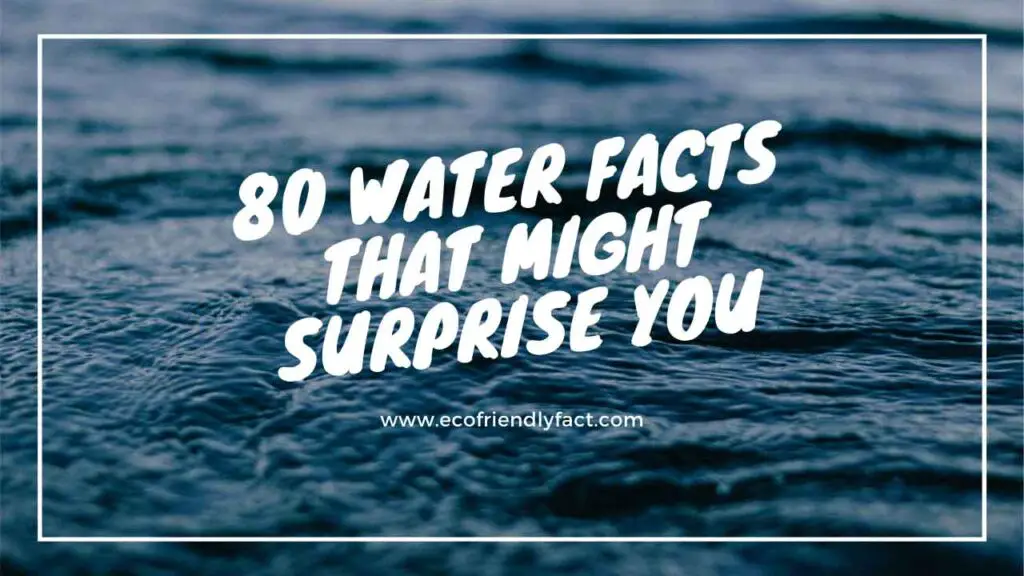From our childhood, we keep hearing the one line that water is life and we cannot survive without water. Is that all about the water? It’s the bottom line but there are a lot more facts about water that you might not know.
In this article, I’ll share 80 interesting facts about water that you should know.
80 Interesting Facts About Water
Water Health Facts
- Drinking water may boost your metabolism. According to a study, drinking ½ liter of water can boost the metabolic rate by 30% for over an hour.
- Water helps to separate and expel the waste of our bodies through sweating, urination, and defecation. If you drink enough water, it’ll allow your kidneys to work properly to filter waste and prevent kidney stones.
- Drinking adequate water is recommended for healthy stool and preventing constipation.
- Water helps to cushion the joints, tissues, and spinal cord to make your body flexible for movement and exercise. It also gives comfort in arthritis.
- Dehydration can cause the risk of headache or migraine in some people.
- Dehydration can also affect the mood and performance of the brain.
Water Nutrition Facts
- Plain water contains no calories.
- There are trace amounts of minerals like calcium, magnesium sodium, copper, and zinc in water. According to a study, adult males and females can meet up 8-16% of the required daily calcium intake and 6-31% of required daily magnesium intake by drinking 2 liters of water every day.
- In the U.S, fluoride is added to tap water to reduce tooth decay.
- Water aids in dissolving vitamins, minerals, and other nutrients from the food you take and delivers these nutrients to the other organs of your body.
Scientific Facts About Water
- Water can dissolve most of the substances than any other liquid. It’s very difficult to produce pure water in a laboratory as almost all chemical compounds will break in the water.
- Water is sticky. The molecules in water tend to stick on each other and other things. This stickiness holds the molecules together as liquid and gives water large surface tension. This large surface tension draws up blood in the narrow vessels in our body.
- Scientists estimate that ice has at least 16 “phases” with different crystal structures.
Shocking Facts About Water
- It’s estimated that all water on this earth has come from space as ice on asteroids and comets. All water on this earth is recycled water. The usable water is recycled in numerous ways- through animals, plants, clouds, oceans, and rocks.
- Water consists of two lightweight gasses. Therefore, water should exist only as water vapor on this earth. But water doesn’t care about the theory!
- Unlike the other liquids, water expands by 9% if it freezes. Sometimes pipes burst in winter because the water in the pipes expands in the cold weather.
- Hot water can freeze faster than cold water. It’s called the Mpemba effect.
Water Waste Facts
- A single dripping per second from a leaky faucet can waste over 11,300 liters of water every year. In an average family, around 9,400 gallons of water are wasted from household leaks. This amount of water can wash over 300 loads of laundry.
- While washing dishes, running your kitchen faucet for five minutes will waste around 10 gallons of water.
- If you’re using an older commode, you need around 3 gallons of clean water in one flush that the people in some regions of this world use in a whole day.
Water Conservation Facts
- Limiting the shower time to 5 minutes, you can save around 200 liters of water.
- Running the dishwasher in a full load can allow you to save nearly 320 gallons of water in a year.
- While brushing your teeth, keeping the tap off allows you to save 8 gallons of water every day. If you shave 2 times a week and turn the tap off while shaving, you can save around 2300 gallons every year.
- An average pool needs around 2,000 gallons of water to get filled. Among that, a large amount of water is evaporated every month. Therefore, cover your pool when you won’t use it for several days.
- Older model commodes use 3 gallons of clean water in every flush. Switching to the newer models will use only 1 gallon.
- Switching to a water-efficient dishwasher will need only 4 gallons of water per wash cycle where the older models need up to 13 gallons.
Water Pollution Facts
- Nearly 70% of the total industrial waste goes to water.
- Domestic garbage is responsible for 80% of the total water pollution.
- Over 2.70 billion kilograms of plastic and other garbage are mixing in the oceans every year.
- After the earthquake and tsunami of 2011, Japan released 11 million liters of radioactive wastewater into the Pacific Ocean. The waste from this tsunami led to a total of 70 kilometers of floating islands in the Pacific Ocean.
- There are more contaminated rivers in Asia than in any other continent. These rivers are mainly polluted from human waste.
- Around the world, nearly two million tons of human waste mix in water every day.
- The Ganges in India is said to be the most polluted river with garbage, dead animals, humans, etc.
- In the U.S., 40% of rivers and 46% of lakes are unsuitable for fishing, swimming, etc.
- 80% of municipal wastewater is released into the environment without being treated.
Water Facts For Kids
- Water is the only substance that remains in the three form-liquid, gas, and solid.
- 97% of the total amount of water on this earth is salty and not drinkable. 2.1% of water is locked up in polar ice caps, snow, and glaciers. About .007% is freshwater is accessible to humans.
- The Antarctic continent is covered under 10 thousand trillion tons of ice and snow. It has been covered with ice for over 30 million years.
Drinking-Water Facts
- There is no scientific cause behind our common advice of drinking at least 8 glasses of water a day. But staying hydrated is necessary for improving your mood, helping your brain to work better, and so on.
- Every individual drinks nearly 1000 liters of water per year.
- In China, 20% of the groundwater that people use for drinking is contaminated with carcinogens. Around 320 million Chinese people don’t get clean drinking water.
- In developing countries, nearly 80% of the total illness is from contaminated drinking water.
- 15 million 0-5 years age of children die every year worldwide from waterborne diseases.
- Nearly 250 million people die every year from waterborne illness who don’t have access to safe drinking water.
Facts About Water Usage
- An average household in the U.S. uses about 127,400 gallons of water every year.
- An average family uses 30% of their total water usage outdoor. The percentage can go up to 60 depending on the climate of that region.
- A sprinkler of your outdoor garden can use nearly as much water hourly that is enough for the daily use of a family of four.
- ¼ of the clean water we use daily is spent only for flushing the toilets.
- Our bathtub needs 80 liters of water to get filled with water.
- In the production of one kilogram of cotton, we need 10,000 liters of water. With that amount of cotton, you can get only a shirt and a pair of jeans. So, imagine how much water you’ve stored in your cupboards!
- The coffee beans you’re adding in one cup of coffee costs 200 liters of water to get produced.
- To get 1 kg of beef you’ve to spend 15,000 liters of water for the cow.
Facts About Water On Earth
- NASA has discovered water on the moon. But that is not liquid but ice. There is also ice on the poles of Mars.
- Only 0.007% of the total water on this earth is accessible to humans. This small percentage is providing drinkable and usable water to human beings from the very beginning of mankind.
- On this earth, the water spreads in 1.5 billion cubic kilometers. The amount is around 1.5 billion trillion liters that are equal to 800 trillion Olympic swimming pools.
- If it was possible to spread this huge amount of water evenly over the surface of the earth, the depth would be about 3,700 meters.
Fun Facts About Water In The Body
- Water moves from your empty stomach 5 minutes after you drink it. So, drinking water 5 minutes before taking your lunch or supper won’t make you feel full.
- 70% of our brain is water. Did you ever feel that you’re roaming around with so much water in your brain?
- Our body has 60%-70% water. A human fetus is nearly 95% water in the first months. At the time of birth, babies have 77% water in their bodies.
- If you’re an adult of 60 kg, you’ve around 36-liter water in your body. Two-third of the water are stored in the cells.
Water Facts Of Life
- Where there is liquid water on this earth, there is life, even if the water is acutely acidic or has a nearly boiling temperature.
- More than 80% of life on this earth is aquatic. This earth belongs to them indeed!
- 75% of a living tree consists of water.
- A person cannot live without water for more than 5-7 days.
Facts About The Water Cycle
- Even now we have the same amount of water on Earth as it was when the earth was created. Water is being recycled every moment. The water in which you’re taking shower can be from the ages of dinosaurs.
- The sun drives the whole water cycle.
- Water that we’re pouring in the gardens, or wastewater that we’re dumping in the drain all will get back to us sooner or later.
- Groundwater can be stored for thousands of years before moving anywhere else.
- Plants sweat like human beings. They sweat to cool themselves and cool the surrounding by releasing water into the atmosphere. This process is called transpiration.
- The water cycle recycles less than 1% of usable water for us.
Facts About Water Scarcity
- According to research, around 1.8 billion people will live in areas with acute water scarcity by 2050 where two-thirds of the total population of this world will live in water-stressed areas.
- Every 1 in the 5 developing countries will face water scarcity by 2050.
- Over one-third of the population of Africa doesn’t have the access to safe drinking water.
- By 2050, five times more land is anticipated to go through “extreme drought”.
- California can need three times more groundwater than the present resource after a century.
- Around the world, nearly 4.5 billion people already live in those areas where there is a drying or polluted water resource within 50km.
Water Buffalo Facts
- Water buffalos submerge in water or wallow in mud almost the entire day.
- They’re very sensitive to heat because they have very few sweat glands. This is the reason they tend to wallow in mud all the time. It helps to keep them cool since water in mud evaporates very slowly.
- The river water buffalo are pets for their milk while the swamp water buffalo were domesticated for their strength.
- Water buffalo’s milk has very high protein compared to the other buffalo and it’s famous for producing various types of cheese.
Water Is Essential For Life
The interesting facts about water show that water is vital for all the lives on this earth. For its unique chemical properties, there is no substitute for water for living organisms. All cellular processes in animals and plants are driven by water.
Oxygen, nutrients, and minerals dissolve in water and reach the different organs in our body. No other liquid other than water can drive the photosynthesis process in the plants. Therefore, water is essential for all living organisms on the earth.
Water Shortages
Overuse of water, wastage of water, increasing global population, water pollution, shortage of infrastructure, effects on the weather for climate change are the main causes that trigger water shortage. While the demand for usable water is not going to decrease, we have to conserve water and stop water pollution from our ends.
What Does Water Do For The Body?
Water helps to drive the vital functions of the body. From creating saliva in the mouth, digesting food to helping excrete the body waste, water is needed for every physiological function.
Water boosts up the metabolism rate and helps your body to absorb nutrients from the food. Keeping hydrated also affects the energy level and performance of the brain significantly.
Studies have found the link of water with the ability to prevent diseases like migraine, headache, constipation, kidney stones, bladder, and urinary tract infection, and so on.
Why Is Drinking Water Important?
Drinking adequate water is necessary for maintaining the balance of body fluids. Our body is comprised of mostly water. The fluids in the body aids in digestion, nutrient absorption and transportation, oxygen circulation, saliva production, and regulation of body temperature.
Drinking enough water can aid in losing weight by increasing your metabolic rate. To maintain all these vital bodily functions, drinking enough water is essential.
How Can I Help End The Global Water Crisis?
From these interesting facts about water, we can predict that we’re is going to face a global water crisis soon. To battle the global water crisis, we have a lot of things to do. But as an individual also you can take initiative to end the water crisis around the world.
- Know how you can conserve water and change your habits and lifestyle according to that. Make awareness about the importance of water conservation in your family, neighborhood, and circle.
- Shift to water-efficient fixtures and appliances.
- Use eco-friendly cleaning products and detergents for your household to reduce pollution in water.
- Try leading an eco-friendly lifestyle.
- Use recyclable and recycled products to reduce waste in water sources.
How Should You Drink Water Correctly?
The proper way to drink water is to drink it sitting down and finishing it in slow sips. While you drink water, follow these-
- Drinking water while standing can upset the stomach and lead to some health issues like GERD, kidney damage, arthritis, etc.
- Don’t drink too much water at a time.
- Always try to drink room temperature or a little cool water. Too cold water can kill the digestive juices.
- Drinking a glass of water after waking up in the morning is a good habit. You can take a glass of water 20-30 minutes before a meal, before and after the workouts.
Conclusion
I hope these interesting facts about water will help you understand the importance of conserving water and discourage waste or pollute water. Water resources can seem abundant, but once we pollute them, the consequence will return to us sooner.

















